It goes without saying that COVID-19 has had a profound impact on the economy and our way of life. Restrictions imposed to halt the spread of the virus, such as limitations on travel and group gatherings, have destabilized industries and jeopardized the future of businesses both big and small.
But how has the pandemic specifically impacted creative small business owners and service providers? We wanted to know how the solopreneurs and independent freelancers who bring so much to our communities have fared during this challenging time.
To find out, we took a look at aggregated, anonymous data from over 600,000 transactions and bookings on HoneyBook’s platform from February 1, 2020, to July 17, 2020. HoneyBook is the leading business management platform with over $2 billion in bookings, and our user base is a strong indicator of industry trends. In this report, we share what we’ve learned about the impact of COVID-19 on the freelance economy.
The Initial Economic Impact of COVID-19
COVID-19 rapidly and severely impacted the freelance economy. By the end of March 2020, service providers were transacting at only 50% of February 2020 levels.
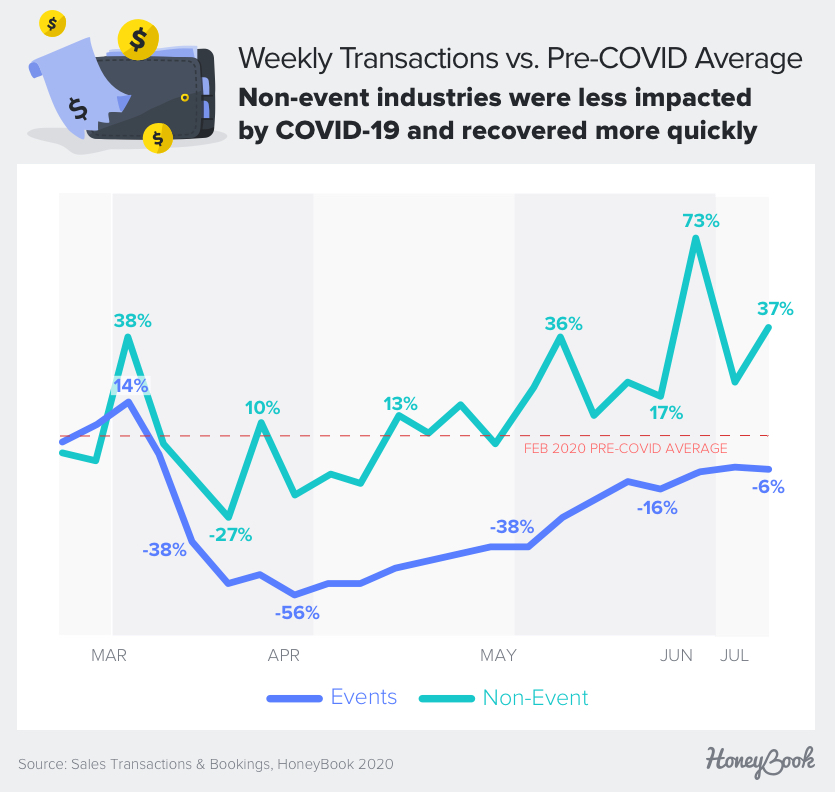
Event industry professionals, which includes event planners, photographers, videographers and floral designers, were hit the hardest and saw transactions decline by 56% (week of April 4, 2020, vs. average week in February 2020). 50% of events previously booked for April and May 2020 were rescheduled for a later date while 10% were cancelled.
“The initial impact on my business as a wedding planner honestly was panic. I had a wedding planned for March 21, and as of 7 days before the event, we were all good to go since it was less than the 250 person guidance and the venue was not willing to let us reschedule, then suddenly just 5 days before the event, we had to reschedule all vendors who were paid in full to late Summer,” said Feyisola Ogunfemi, owner of Statuesque Events. “That wedding is now scheduled for April 2021, over a year beyond the initial date.”
Non-event industries, which includes marketing professionals, interior designers, business coaches, and web and graphic designers, were also impacted initially but saw a less dramatic decline of 27% in transactions by the week of March 21. They also rebounded more quickly starting early April and have not been as severely affected since. By May 2020, non-event industries as a whole were transacting at February levels.
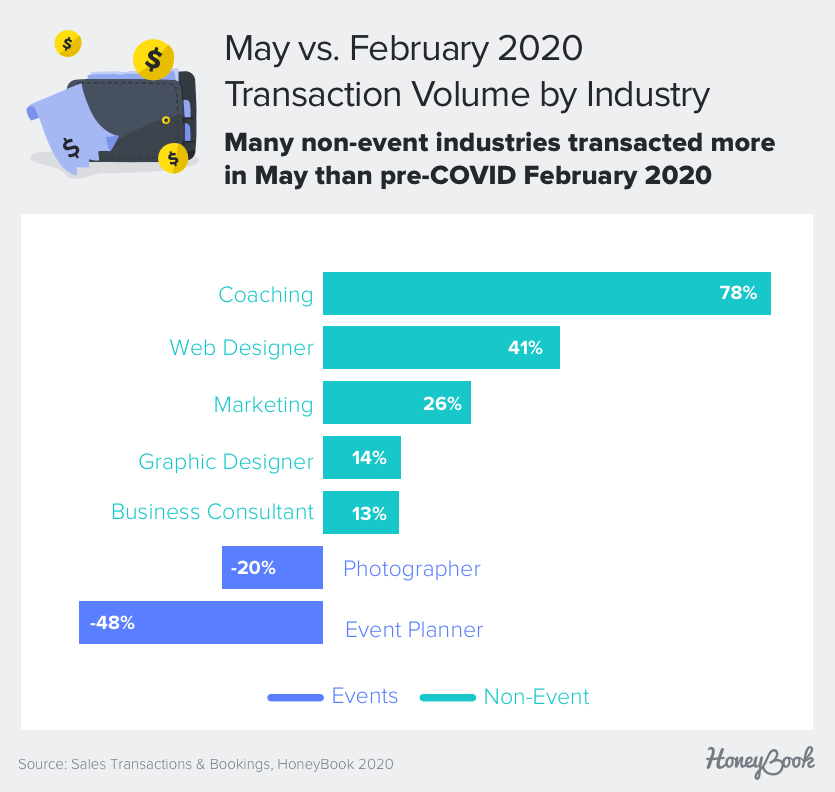
All states experienced a sharp decline in transactions in early March. States including California, New Jersey, Arizona and Florida were most impacted, dropping to between 30% to 40% of their pre-COVID transaction volume by mid-March. Today, California and Florida are transacting at 65% of pre-COVID levels and New Jersey has risen to 88% of pre-COVID levels while Arizona remains low at 45% of pre-COVID levels.
Re-opening and COVID-19 Recovery
As states started reopening there was a steady increase in transactions, with Texas showing the strongest recovery from 45% of pre-COVID transaction volumes in mid-March to 80% of pre-COVID transaction volumes by the end of June. Florida, which saw one of the sharpest declines in transactions to 35% of pre-COVID levels by early-April, also recovered strongly to 70% of pre-COVID levels by the end of June.
States that re-opened earlier like Florida and Virginia began to see recovery earlier as compared to others like California and New York, which only started to see recovery at the end of May.
Looking Ahead and COVID-19 Resurgence
By early June, bookings in the US had rebounded to ~80% of pre-COVID levels, from a low of 45% in mid-April.
Now that reopening plans are being rolled back, in the last four weeks, June 20 to July 19, growth has stalled and total bookings have since plateaued. This could be due to the fact that economic plans are more uncertain than ever, thus creating confusion and apprehension among freelancers and their clients.
Transactions indicate current business activity, whereas bookings are a snapshot of future business activity. Therefore a decline in bookings suggests the loss of future work and income for creative freelancers.
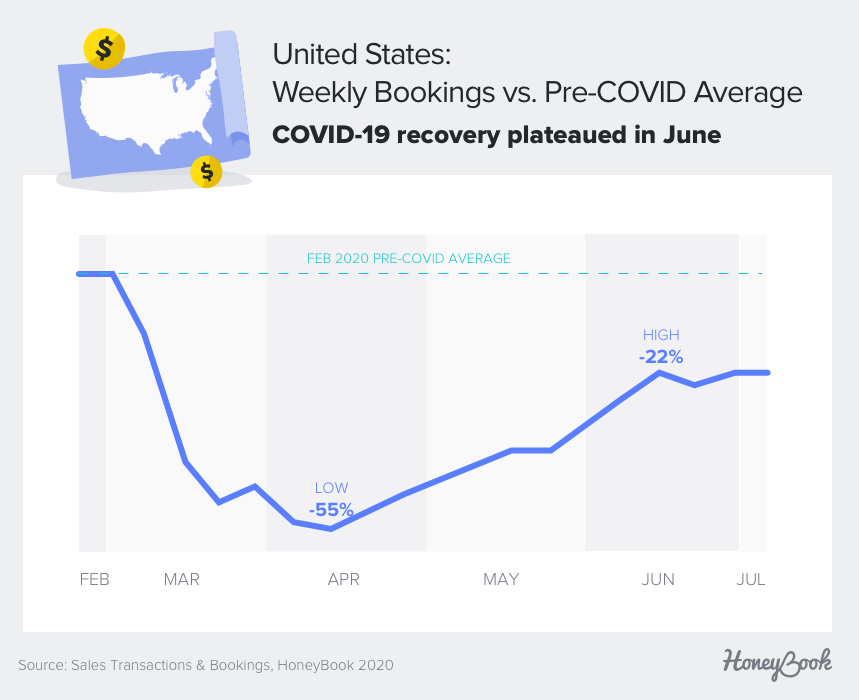
After hitting a peak in early June, several key states have since seen a decrease in bookings. This is especially true for those states currently experiencing a surge in COVID cases.
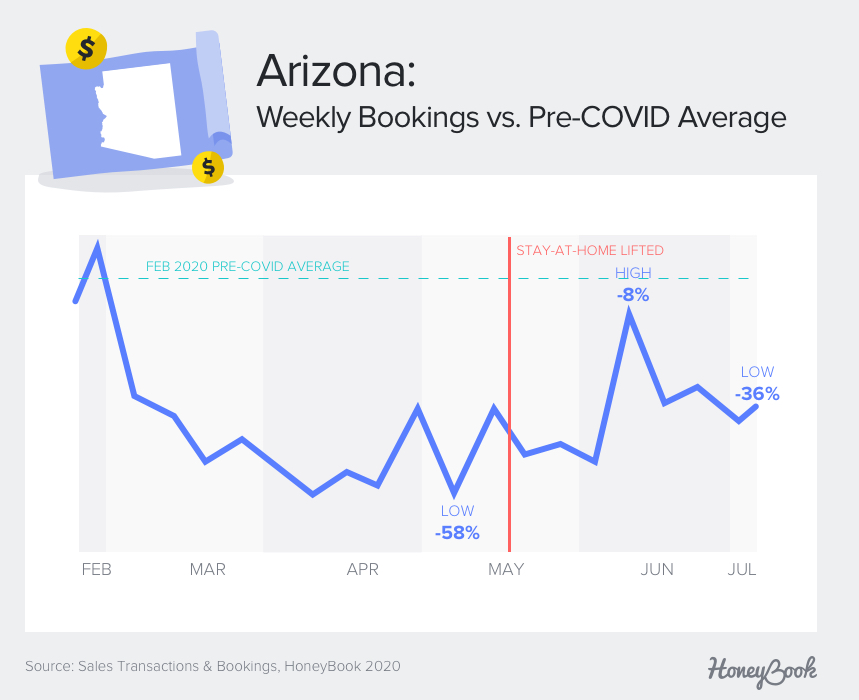
- In Arizona, bookings reached 92% of pre-COVID levels by the week of June 13 before dropping to 64% of pre-COVID levels by the second week of July, a 30% decrease.
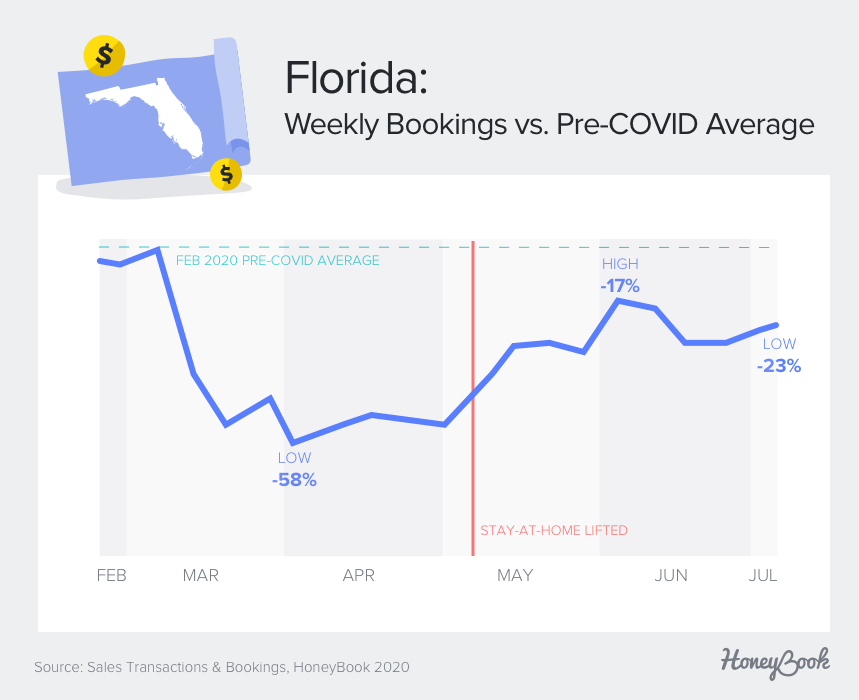
- In Florida, bookings reached 83% of pre-COVID levels by the week of June 6 before falling to 77% of pre-COVID levels by the second week of July, a 7% decrease.
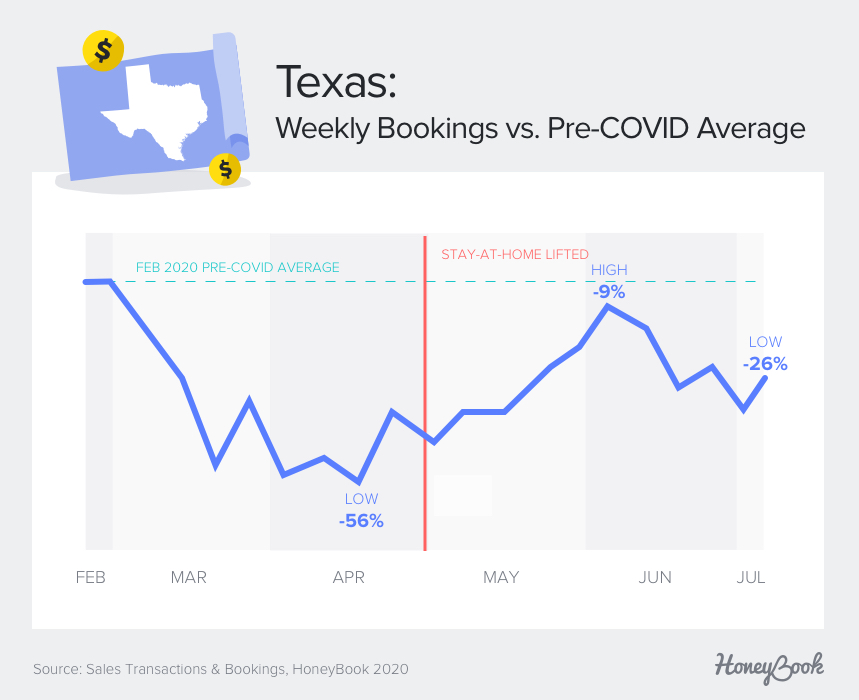
- In Texas, bookings reached 91% of pre-COVID levels by the week of June 6 before dropping to 74% of pre-COVID levels by the second week of July, a decrease of 18%.
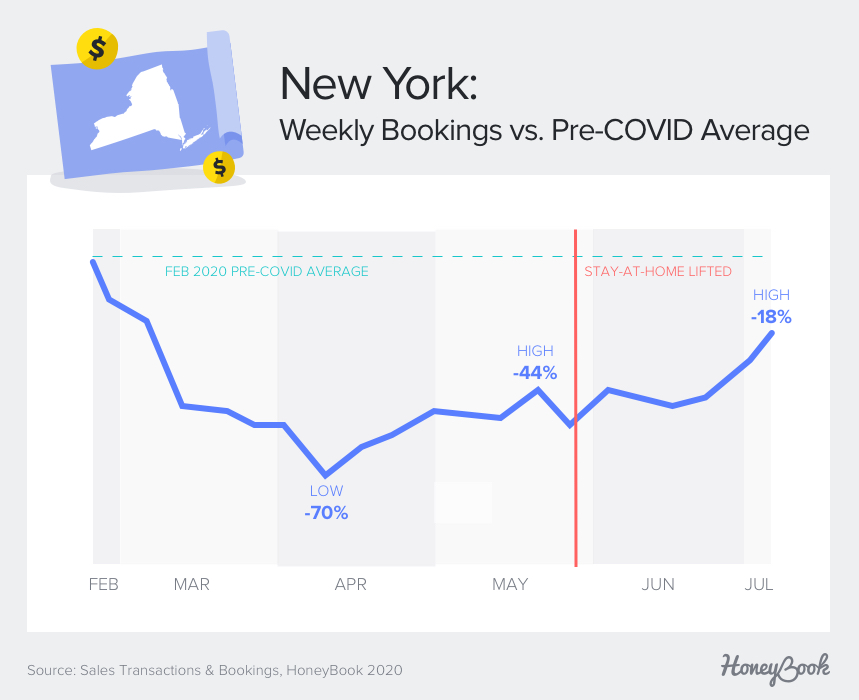
- In New York, bookings reached 56% of pre-COVID levels by the week of June 6 before surpassing this high to reach 82% of pre-COVID levels by the second week of July, an increase of 46%.
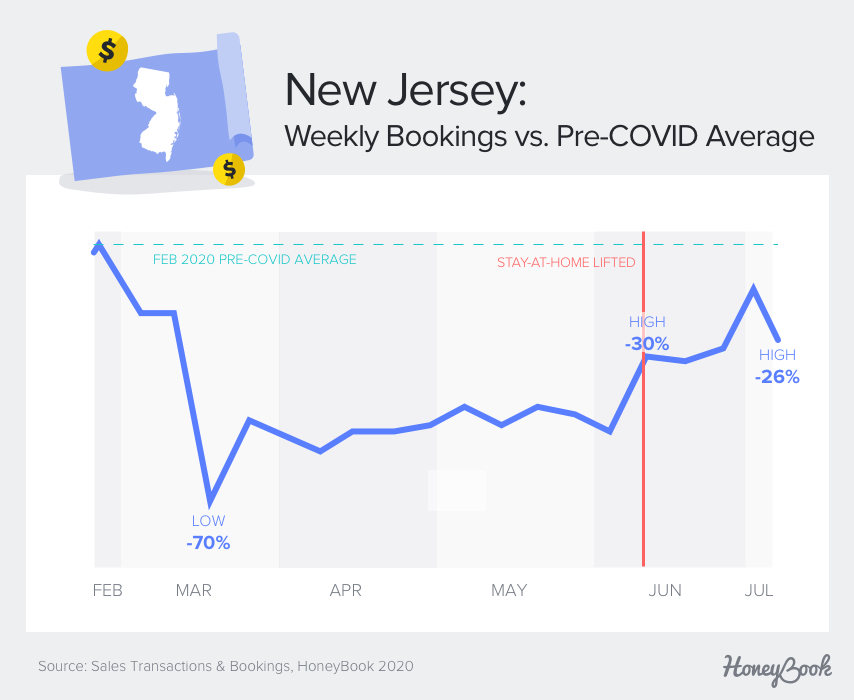
- In New Jersey, bookings reached 70% of pre-COVID levels by the week of June 13 before surpassing this high to reach 74% of pre-COVID levels by the second week of July, an increase of 6%.
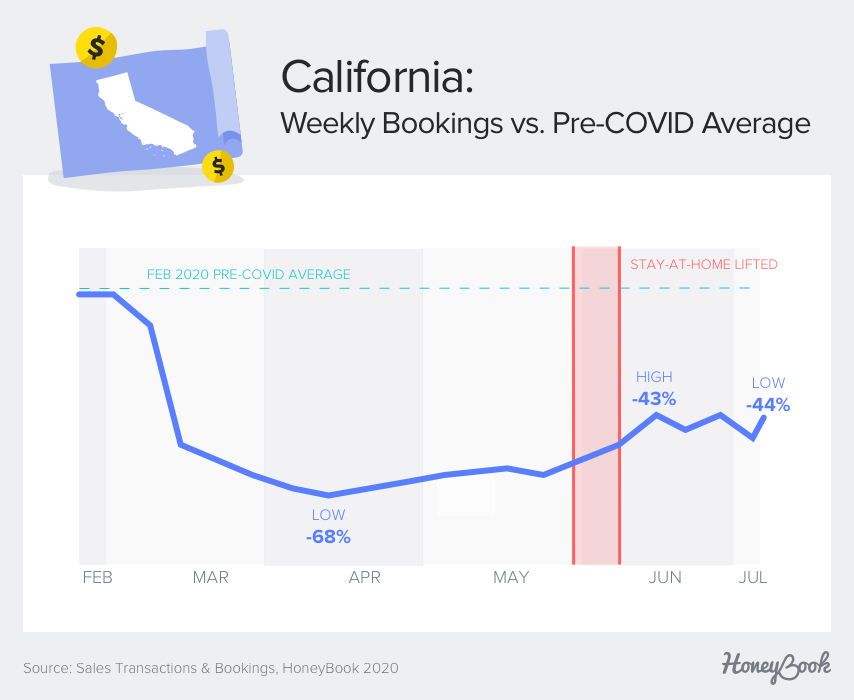
- In California, bookings reached 57% of pre-COVID levels by the week June 13 and has fluctuated around that level since.
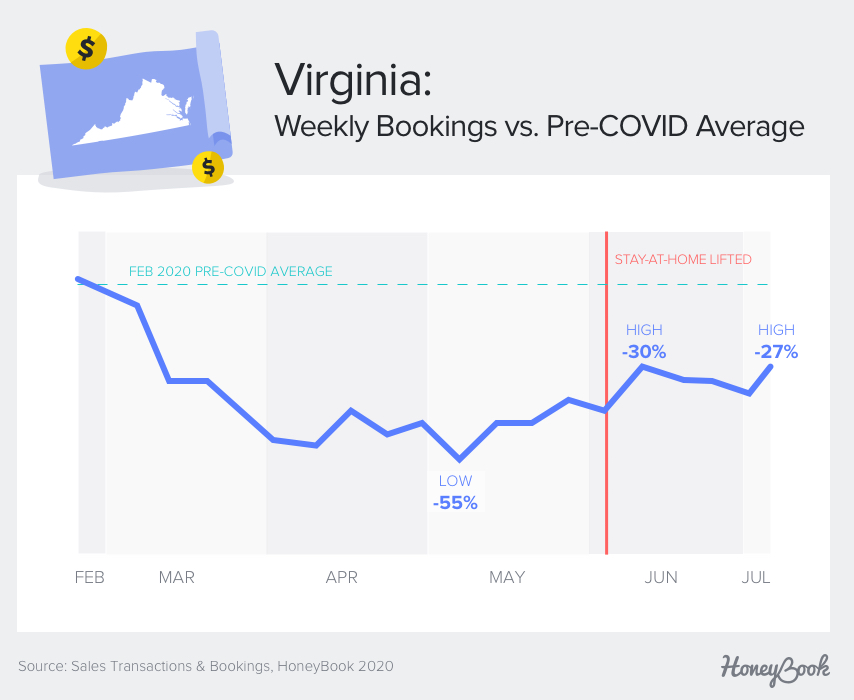
- In Virginia, bookings reached 70% of pre-COVID levels by the week of June 13 before surpassing this high to reach 73% of pre-COVID levels by the second week of July, a 4% increase.
“The recovery rate among freelancers is encouraging and demonstrates how resilient these small business owners are in the face of uncertainty,” said Oz Alon, Co-Founder & CEO of HoneyBook. “But there are challenges still to come and as COVID-19 cases surge across the country, freelancers will need to continue managing client relationships and innovating to find solutions for their business. We’re committed to supporting them with the advice, resources and tools they need to weather this storm.”
While 58% of projects rescheduled in late March and early April were postponed for up to six months, that percentage has dwindled to 21% by early July. Instead, 43% of projects rescheduled in early July were postponed for more than 6 months.
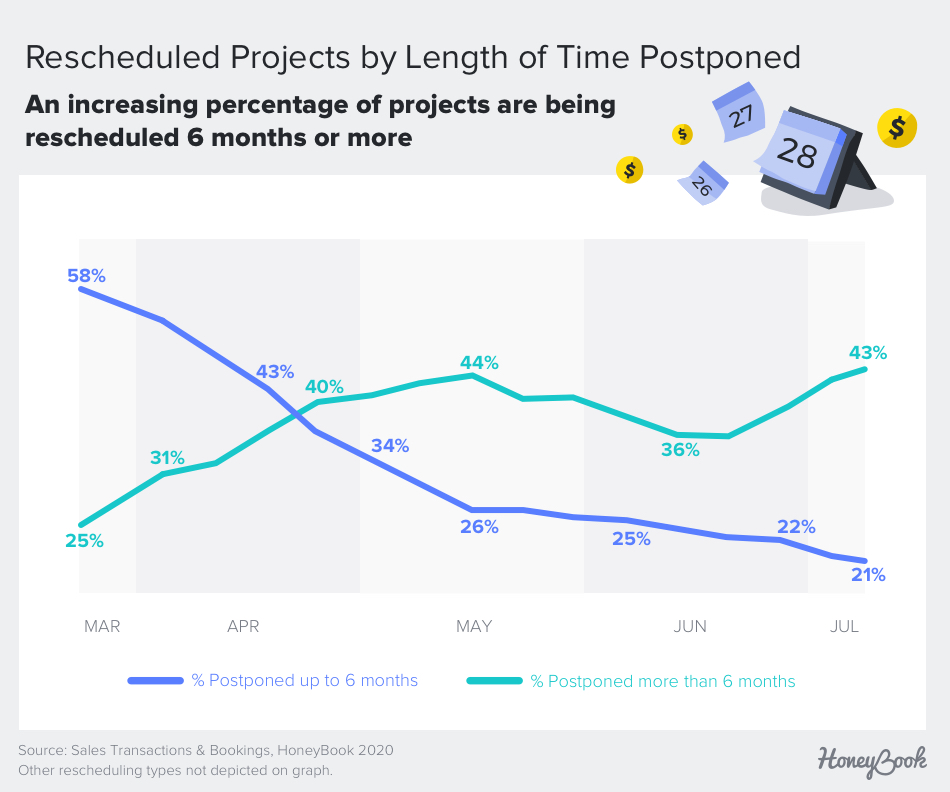
This shift in rescheduling behavior suggests a broader understanding by the general public of the time it may take for the country to recover fully from COVID-19. It appears that business owners and their clients are anticipating an extended recovery time and are therefore postponing their events for longer.
Although the future is uncertain, we have seen small businesses adapt and pivot to work within the new constructs of the pandemic. With quick action, business owners can mitigate the impact of COVID-19 and even uncover new revenue opportunities.
Learn more about how these HoneyBook members pivoted their businesses in the wake of COVID-19.



